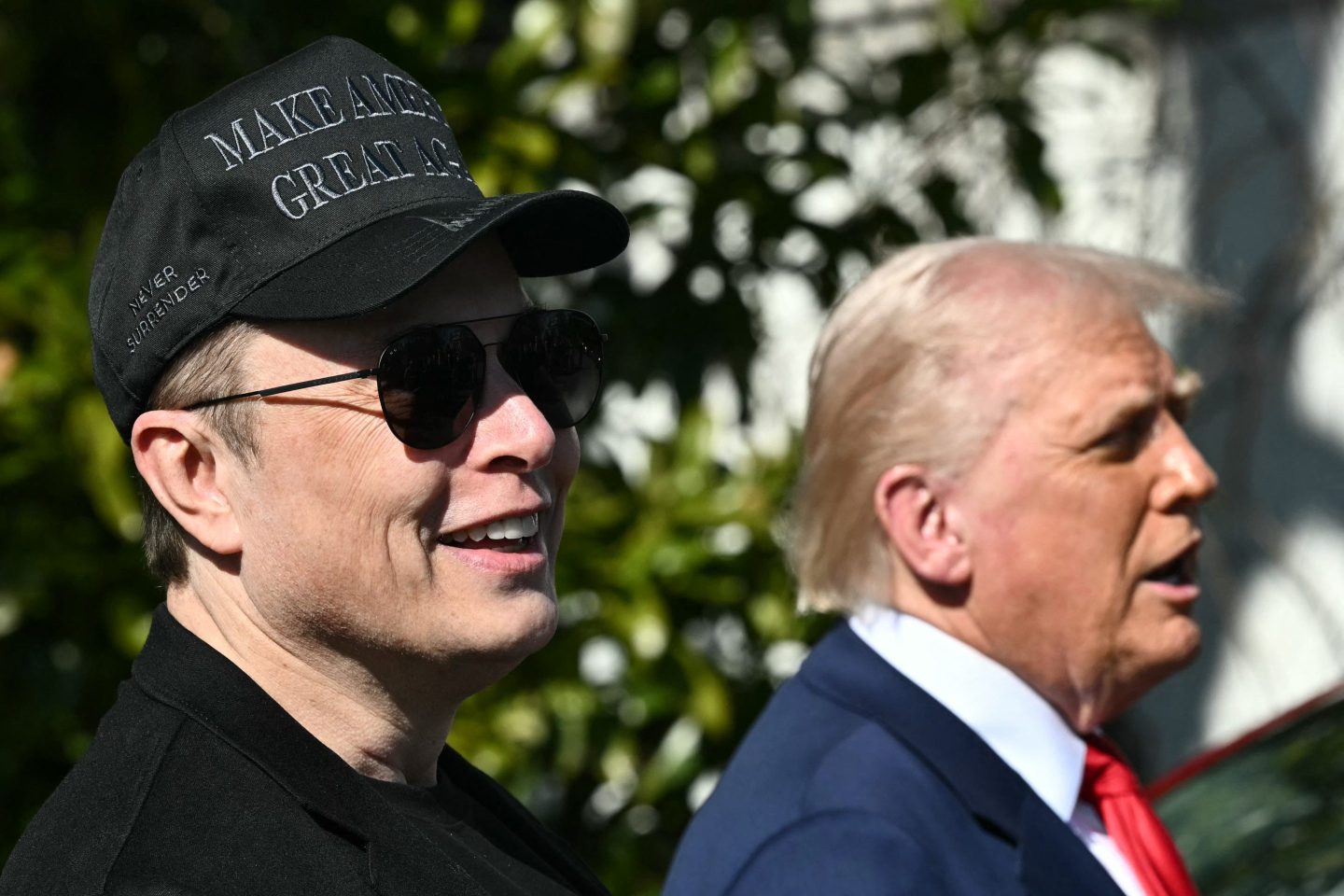- In today’s CEO Daily: A European scooter maker tells Peter Vanham why the tariffs won’t make them open a factory in the U.S.
- The big story: Trump isn’t backing down on the tariffs despite global opposition.
- The markets: A brief period of respite.
- Analyst notes from JPMorgan, Wedbush, UBS, and Goldman Sachs on Trump, tariffs and recession.
- Plus: All the news and watercooler chat from Fortune.
Good morning. The U.S. stock market has registered its feelings about tariffs, with all the major indices reeling after days of losses. But how are foreign companies reacting? The scooter and carmaker Micro sells over half a million kick scooters a year in the U.S. But going forward, the scooters may get a lot harder to find, and become a lot more expensive, OIiver and Merlin Ouboter, the company’s second-generation executives, told me.
Facing President Trump’s tariffs of up to 54% on any goods made in China (where Micro makes the majority of its products), the Ouboters offer a playbook on how foreign companies plan to respond. They certainly aren’t scrambling to move manufacturing to the U.S. Instead, they told me, they’re preparing to pull some of their products off the U.S. market, and hope consumers will pay a higher price for the remaining ones.
“As a company, you wouldn’t invest in producing in the U.S. now,” Oliver Ouboter told me. “I don’t even know if the tariffs are going to hold up for three months. It’s kind of impossible to plan. So all these products will just become more expensive. There will be less variety.”
The lowest-priced products are most likely to disappear from Micro’s U.S. offering, since the margins are the smallest. Its premium kickboards, on the other hand, will likely be priced higher, as the company plans to pass some of its additional levies on to the consumer.
And Micro’s Microlino car, an Italian-made golf cart on steroids may never make it to the U.S. at all, despite having previously been set for launch there this summer. With a quirky, minimalist design and just two narrow seats, the fully electric mini car would have always been a long shot in the country of SUVs. “But with a 25% tariff, you outprice yourself,” the Swiss entrepreneur said.

In this, Micro is not alone—all European and Asian car makers are facing the same brutal math. “Let’s imagine a scenario in which you have 25% tariffs today. And then sometime in the future it isn’t 25% anymore. Then you have huge fluctuation of prices. It is impossible,” Ouboter said.
Nor is moving car manufacturing a solution for all foreign brands, he said. To make the Microlino in the U.S., the OEMs he sources his parts from would need to move first. And even so, the influx of other manufacturers—in every sector from cars to pharmaceuticals to textile—would mean labor costs and prices would get out of control.
“If you look at the unemployment rate, if all these companies start manufacturing in the U.S., you need people. Where do you get them from? The prices will go even higher, because you will need to pay people even higher. There will be massive inflation on all goods,” Ouboter said.
As for the hit to revenues, Ouboter didn’t seem overly worried. He pointed to the remaining growth potential in Asian markets such as South Korea and European markets such as Germany, Switzerland and the U.K., where Micro still gets a majority of its revenues. “We’ll focus on innovations for their older populations, making our products more accessible in these markets,” he said. — Peter Vanham
More news below.
Contact CEO Daily via Diane Brady at diane.brady@fortune.com
Top news
China vows to fight Trump. President Trump threatened to levy an additional 50% tariff against China on Wednesday after the country responded to last week’s tariffs with a 34% tariff on U.S. imports. If added, the total tariff against China will be 104%. China vowed to resist: “If the U.S. insists on its own way, China will fight to the end,” Beijing said.
But Trump isn’t backing down. Peter Navarro, Trump’s senior counselor for trade and manufacturing, said in an op-ed for the FT that the president’s plan was to completely rebalance all world trade in favor of the U.S.: “This is not a negotiation. For the US, it is a national emergency triggered by trade deficits caused by a rigged system … know this: that’s just the beginning.” The tariffs themselves “mean nothing” he said elsewhere “because it’s the non-tariff cheating that matters.”
First signs of a split between Musk and Trump. Elon Musk made a direct appeal to Trump over the weekend to reverse course on tariffs but the president stuck to his guns. Musk signalled his disagreement with the tariff plan by posting a video of Milton Friedman on X in which the great economist explains how many countries need to work together to make a simple pencil. Musk also told a political rally in Italy that he hoped to see a zero-tariff situation between the E.U. and the U.S.
Unhappiness over tariffs spreads. The U.S. Chamber of Commerce is considering filing a lawsuit against the Trump administration to stop the tariffs from going into effect, Fortune exclusively learned. The lobbying group represents millions of American companies, though its spokesperson Matt Letourneau declined to comment.
Dimon wants it “resolved.” In a letter to shareholders on Monday, JPMorgan Chase CEO Jamie Dimon described “considerable turbulence” working against the economy and cautioned that tariffs will stunt the economy’s growth. “The quicker this issue is resolved, the better,” Dimon wrote.
GOP donors and Texas Senator Ted Cruz are also grumbling. “Every country is freaking out. The American stock market is in decline. Now, we're in the second week. Where do we go from here?" Cruz said.
Fink thinks we may already be in a recession. “The economy is weakening as we speak,” the BlackRock CEO said. The “canary in the coal mine” is airlines, which he heard are already seeing a downturn.
Airline bookings are, in fact, way down. Bloomberg reported: “Canadian flight reservations to the US through September are down a staggering 70% from the same period last year … Sébastien Bazin, chief executive officer of French hotel group Accor SA—whose dozens of hotel brands include Fairmont and Sofitel—told Bloomberg Television that European bookings to the US this summer are down 25%, surmising one reason is ‘bad buzz’ from the border detentions.”
The U.S. will hold direct talks with Iran over nuclear weapons this weekend.
The markets
- Yesterday was a weird day in the markets as an erroneous, anonymous report that the president would give the world a 90-day reprieve on his trade tariffs had stocks briefly soaring before they came back down to earth again. The S&P 500 ended down 0.2% but the Nasdaq Composite was flat. Asian markets began strongly this morning. Japan’s Topix was up 6.3%; China’s CSI 300 was up 1.7%. The UK’s FTSE 100 followed suit, rising 2% in early trading. Europe’s Euro Stoxx 600 went up 1.4% in the same period. S&P futures were up this morning premarket by 1.6%.
From the analysts
- JPMorgan on Trump: “JPM Economics is now assuming a US recession this year if the announced tariffs remain in place, with GDP contracting by -0.3% for the full-year and unemployment rising to 5.3%. Due to the highly unique backdrop—the fate of the equity market is essentially in the hands of one individual who can unilaterally ease or deepen this shock—the range of outcomes for risk assets globally is abnormally wide and binary,” per Dubravko Lakos-Bujas et al.
- Wedbush on tech: “We believe the price impacts from this head-scratching tariff slate could result in demand destruction of 15%-20% in 2025 for new auto purchases alone based on our estimates. The tariffs are a debacle of epic proportions for the auto industry and US consumers as the concept of a US-made car with all US parts is a fairy tale fictional narrative. This tariff announcement (in its current form) will send the auto industry into upside down mode and raise the average price of cars between $5k on the low end and $10k to $15k on the high end,” per Daniel Ives et al.
- UBS on Trump: “Over the weekend, US administration officials gave contradictory statements on trade taxes, causing investors to question the existence of a masterplan. Attempts to justify attacks on the Heard Island penguins only emphasized the peculiarity of the tariff formula,” per Paul Donovan.
- Goldman Sachs on recession: “We are lowering our 2025 Q4/Q4 GDP growth forecast to 0.5% and raising our 12-month recession probability from 35% to 45% following a sharp tightening in financial conditions, foreign consumer boycotts, and a continued spike in policy uncertainty,” per Jan Hatzius et al.
Around the watercooler
Trump’s tariff formula used the wrong value in its calculations, conservative think tank says. ‘This whole thing was rigged’ by Paolo Confino
Thousands of North Korean IT workers have infiltrated the Fortune 500—and they keep getting hired for more jobs by Amanda Gerut
Zillow’s happy workforce: 93% of employees endorse the company, thanks to 3 key factors by Ashley Lutz
U.S. oil prices dip below nerve-wracking $60 threshold with record-high production in the balance by Jordan Blum
Investor Bill Ackman pleads with Trump White House not to declare a ‘global economic war against the whole world at once’ by Christiaan Hetzner
Wall Street dreamed of a resurgent IPO market under Trump—instead the window is firmly shut for Klarna, StubHub and other hopefuls by Luisa Beltran












